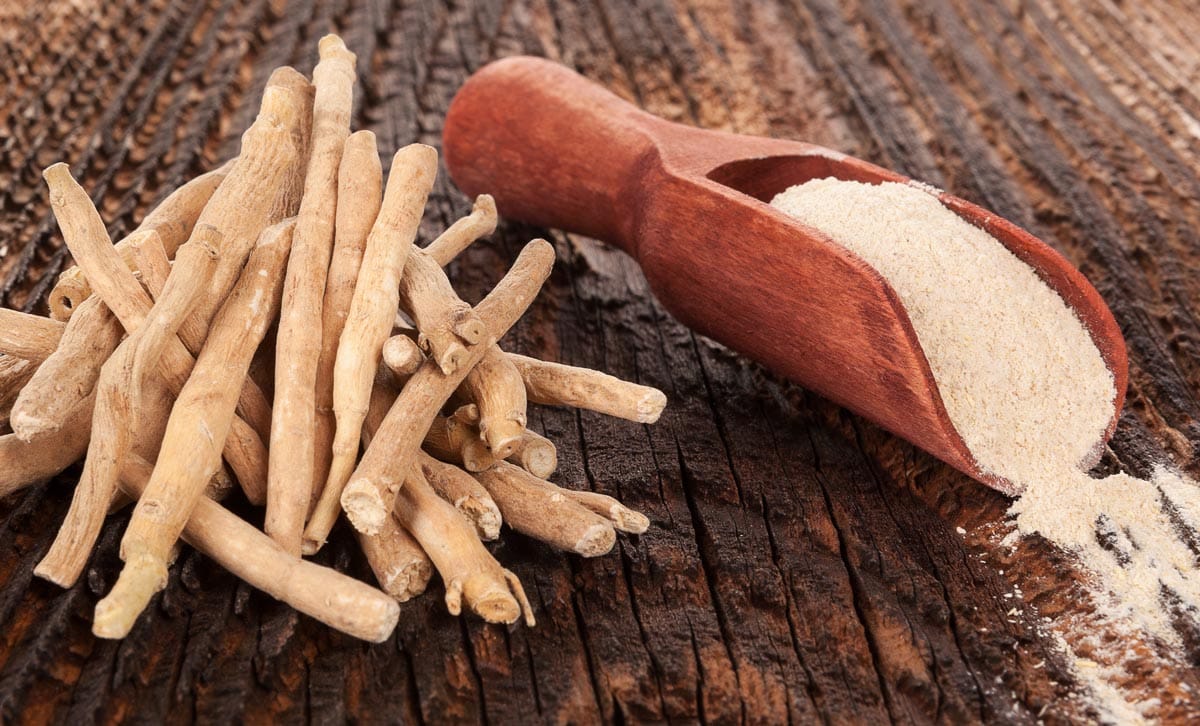Your cart is currently empty!
Category: Woman’s Health
-

Ashwagandha, the Ancient Adaptogenic Herb
Statistics suggest that stress in America is on the rise, with as much as 63% of the U.S. workforce having considered leaving their jobs to escape work-related stress. According to a Harris Poll conducted for the American Psychological Association, the economy, our jobs and health issues rank among the top stressors for survey respondents. The World Health Organization estimates that 12 billion workdays are lost annually worldwide due to anxiety or depression, at a cost of one trillion U.S. dollars per year.
With the ever-rising costs of healthcare and less access to in-person doctor visits, self-care is becoming a more important means of maintaining our physical and mental wellbeing.
As APA President Rebecca W. Brendel, M.D., J.D. states, “What’s promising is that many Americans are aware of their mental health needs and taking steps to improve their own mental health.”

The Ashwagandha Plant, Withania Somnifera
Stress is not just a modern-day dilemma. People have sought solace from worry and anxiety for centuries. Since life began in a Garden, it makes sense to consider the plants that God has given us as potential sources for wellness solutions. One plant in particular has shown great promise in this area, both practically and scientifically: Ashwagandha.
Originally found in the driest parts of India, the Middle East and parts of Africa, Ashwagandha grows as a desert shrub. This hearty evergreen goes by many names, including winter cherry, Indian ginger and even poison gooseberry.

Traditional Uses
The ancient peoples of the Indian subcontinent used the plant’s roots, leaves, berries and even bark for myriad medicinal purposes.
The American Botanical Society says that the dried root and whole plant are used in Indian folk medicine and references the claims of ethnobotanist James Duke, PhD, that various parts of the Ashwagandha plant are used as folk remedies for everything from hypertension and senility to asthma and hiccups.
This ancient herb has garnered newfound interest in our day for its adaptogenic properties.
adaptogen – Adaptogens are natural substances, such as herbs and roots, that may help the body adapt to and better manage stress.
The Role of Cortisol
Cortisol is a hormone our body releases as part of the fight-or-flight response. When we feel threatened, our adrenal glands release hormones including cortisol and adrenaline into the bloodstream. These hormones work together to raise heart rate, increase glucose in the bloodstream and help ensure your body can repair itself more efficiently.
cortisol – Cortisol is the body’s primary stress hormone, which is released by the adrenal glands in response to a perceived threat
This natural process is helpful if you’re facing a dangerous or threatening situation. When your body is constantly in fight-or-flight mode because of work deadlines or difficulties in a relationship, however, chronic stress can lead to a number of health problems.
According to the Mayo Clinic, overexposure to cortisol puts you at increased risk for health problems such as these:
- Anxiety
- Depression
- Digestive problems
- Headaches
- Muscle tension and pain
- Heart disease, heart attack, high blood pressure and stroke
- Sleep problems
- Weight gain
- Memory and concentration impairment
Studies have shown that Ashwagandha helps balance the stress hormone cortisol, which should be higher in the daytime and lower at night.
Less Stress > Balanced Cortisol > Lower Blood Pressure > Greater Wellness]
Ashwagandha for Stress Relief
Genetics and life experiences help determine how you react to stress. Regardless of your background or whether you’re able to change your circumstances, there are steps you can take to manage stress better. You may want to keep a journal, volunteer in your community or take up a hobby.
As part of a healthy lifestyle, including a healthy diet, drinking plenty of water and getting seven to nine hours of restful sleep each night, you might want to consider taking an Ashwagandha supplement to help manage stress.
Several studies have supported the assertion that the herb may lessen perceived levels of stress and anxiety–even significantly.
TriVita’s Ashwagandha KSM-66® supplement was developed to help reduce stress and to promote sleep and faster recovery. Unlike many other Ashwagandha supplements, the serving size of our formulation is 600mg, equal to that used in the clinical studies.
Studies of this KSM-66 formulation have demonstrated a significant reduction in perceived stress, as well as better quality of sleep and increased alertness when rising. Less stress and healthier cortisol levels could contribute to better overall health and a greater sense of wellbeing.
References
- https://www.stress.org/daily-life/#:~:text=key%20stress%20statistics
- https://www.apa.org/news/press/releases/stress/2022/october-2022-topline-data.pdf
- https://www.who.int/news-room/fact-sheets/detail/mental-health-at-work#:~:text=Globally%2C%20an%20estimated%2012%20billion,per%20year%20in%20lost%20productivity
- https://www.psychiatry.org/news-room/news-releases/americans-anticipate-higher-stress-at-the-start-of#:~:text=americans%20are%20telling
- https://www.herbalgram.org/resources/herbalgram/issues/99/table-of-contents/hg99-herbprofile-ashwagandha/
- https://www.mayoclinic.org/healthy-lifestyle/stress-management/in-depth/stress/art-20046037
- https://www.goodhousekeeping.com/health/diet-nutrition/a40705977/ashwagandha-health-benefits/#:~:text=may%20help%20dial%20down%20stress
- https://www.forbes.com/health/body/ashwagandha-benefits//#:~:text=relieves%20stress%20and%20anxiety
-

The Top 10 Reasons You Should Take Ashwagandha
Unleash the Power of Nature

In recent years, there has been a growing interest in natural remedies and herbal supplements for promoting well-being and addressing various health concerns. Among these, Ashwagandha, also known as Withania somnifera, has gained significant popularity for its potential health benefits. Derived from a small shrub native to India, Ashwagandha has been used for centuries in that arid desert region. Let’s take this opportunity to explore the top 10 science-supported benefits of incorporating Ashwagandha into your daily routine.
1. Stress and Anxiety Relief
Ashwagandha is renowned for its adaptogenic properties, which help the body adapt to stress. Several studies have demonstrated its effectiveness in reducing stress and anxiety levels. By regulating cortisol, the stress hormone, Ashwagandha may promote a sense of calmness, reduce anxiety and enhance overall resilience to stressors.
2. Improved Cognitive Function
Research suggests that Ashwagandha may support cognitive function and memory. Ashwagandha extract exhibited improved cognitive performance such as increasing short-term working memory and sustained attention. Preclinical studies are showing its neuroprotective properties may aid in combating neurodegenerative conditions by reducing oxidative stress and inflammation in the brain.
3. Enhanced Energy and Stamina
Ashwagandha has been traditionally used as a rejuvenating herb to enhance energy levels and stamina. Ashwagandha supplementation has been shown to increase cardiorespiratory endurance and overall physical performance during physical activity, making it an excellent choice for athletes and individuals with active lifestyles.
4. Immune System Support
Studies have shown that Ashwagandha possesses immunomodulatory properties, helping to strengthen the immune system. It has been shown to enhance immune response and increase circulating antibody cells, which defend against infection due to viruses and toxins.
5. Hormonal Balance
For women experiencing hormonal imbalances, Ashwagandha may be a game-changer. It has been shown to aid in the regulation of the endocrine system, reducing symptoms of PMS and menopause, and promoting overall hormonal balance. Ashwagandha has been used for centuries as an aphrodisiac, as it is believed to enhance sexual health by improving fertility, boosting testosterone levels in men, and increasing libido in both men and women.
6. Cardiovascular Health
Research suggests that Ashwagandha may have beneficial effects on cardiovascular health. Ashwagandha extract helped improve several markers of cardiovascular health, including cholesterol and triglyceride levels.
7. Anti-Inflammatory Properties
Ashwagandha exhibits potent anti-inflammatory properties, which have been demonstrated in various studies. Ashwagandha has been shown to reduce inflammation and potentially alleviate conditions associated with chronic inflammation.
8. Sleep Quality Improvement
Ashwagandha’s calming and stress-relieving properties may contribute to better sleep quality. Ashwagandha supplementation has been shown to improve sleep, the sleep-wake cycle and sleep quality among participants with insomnia.
9. Muscle Strength and Recovery
Athletes and fitness enthusiasts may benefit from Ashwagandha’s ability to improve muscle strength and aid in post-exercise recovery. Ashwagandha supplementation has been shown to significantly increase muscle strength and reduce exercise-induced muscle damage.
10. Anti-Aging Benefits

The powerful antioxidants found in Ashwagandha may protect the body against cellular damage caused by free radicals, thus slowing down the aging process. Its rejuvenating properties have been shown to promote youthful-looking skin, increased vitality, and improved overall longevity and quality of life.
Ashwagandha potentially offers a multitude of health benefits, making it a versatile herb for anyone seeking to improve their overall well-being. From stress reduction and enhanced cognitive function to hormonal balance and immune support, the potential advantages of incorporating Ashwagandha into your daily routine hold great promise. Embrace the power of nature and unlock a healthier, more vibrant life with Ashwagandha.
About Paul Bernitt, DHH

Paul Bernitt is a Board-Certified Doctor of Holistic Health by the American Naturopathic Medical Certification Board. He is also a Master Herbalist, a Holistic Wellness Practitioner, Doctor of Divinity, and has a degree in Mind-Body Transformational Psychology. Additionally, Paul is certified in Clinical Hypnotherapy, Holistic Nutrition, Bioenergetics, and Life Coaching.
Paul’s mission is to end as much needless suffering as possible by helping people discover hope, health, and healing. He has helped thousands of people experience the value of optimal health and wellness so they can live their purpose with greater energy, vitality, and quality of life mentally, physically, spiritually, emotionally, and environmentally.
References
- https://www.ncbi.nlm.nih.gov/pmc/articles/PMC3573577/
- https://www.ncbi.nlm.nih.gov/pmc/articles/PMC6750292/
- https://www.ncbi.nlm.nih.gov/pmc/articles/PMC9565281/
- https://www.sciencedirect.com/science/article/abs/pii/S0378874119339182
- https://www.ncbi.nlm.nih.gov/pmc/articles/PMC4687242/
- https://www.ncbi.nlm.nih.gov/pmc/articles/PMC8397213/
- https://pubmed.ncbi.nlm.nih.gov/34553463/
- https://www.ncbi.nlm.nih.gov/pmc/articles/PMC6438434/
- https://www.ncbi.nlm.nih.gov/pmc/articles/PMC3487234/
- https://pubmed.ncbi.nlm.nih.gov/29620265/
- https://www.ncbi.nlm.nih.gov/pmc/articles/PMC6827862/
- https://www.ncbi.nlm.nih.gov/pmc/articles/PMC4658772/
- https://www.ncbi.nlm.nih.gov/pmc/articles/PMC3252722/20radicals